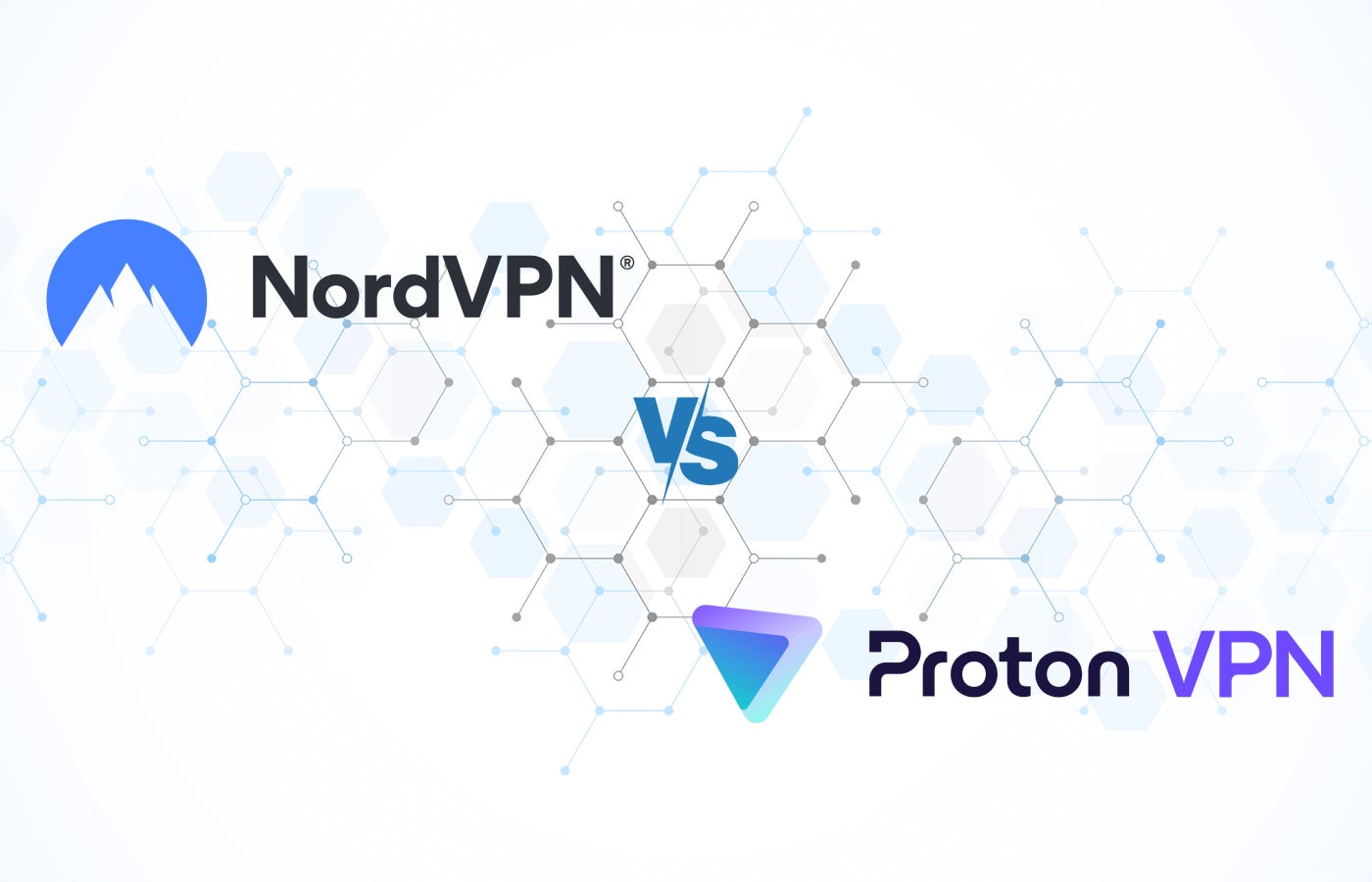As two privacy-focused VPNs, both NordVPN and Proton VPN offer strong features that could make it hard to choose one solution over the other.
NordVPN provides an all around service with an extensive server network and reliably fast VPN performance. On the other hand, Proton VPN operates in privacy-friendly Switzerland and offers a generous free VPN, which could entice budget-oriented users.
In this article, we take a look at which VPN is best for you and your organization.
- NordVPN: Best for most businesses that want a feature-packed VPN that offers a geographically diverse server suite and fast VPN speeds.
- Proton VPN: Best for individual users who want a privacy-centric VPN with a dedicated free version that could be used long-term.
NordVPN vs Proton VPN: Comparison
Both VPNs include the same amount of simultaneous device connections and starting price. They do differ in their respective server suite and free trial access.
| Our rating | ||
| Security protocols | ||
| No. of servers | ||
| VPN server locations | ||
| Simultaneous device locations | ||
| Supported platforms | ||
| Free trial | ||
| Starting price | ||
|
|
NordVPN vs Proton VPN: Pricing
NordVPN pricing
NordVPN’s paid plans have three tiers, with each tier having a monthly, an annual and a two-year plan option. The tiers are NordVPN Basic, Plus and Ultimate — with Ultimate having the most features out of the bunch.
SEE: How to Run a Cybersecurity Risk Assessment in 5 Steps (TechRepublic Premium)
Below is an overview of pricing and feature differences with each tier:
| Basic | Plus | Ultimate | |
|---|---|---|---|
| Monthly | $12.99 per month | $13.99 per month | $15.99 per month |
| 1 year | $4.99 per month | $5.99 per month | $7.99 per month |
| 2 years | $3.99 per month | $4.99 per month | $6.99 per month |
| Features | Includes main VPN | All Basic features plus anti-malware and browsing protection, ad and tracker blocker and data breach scanner | All Plus features plus 1TB encrypted cloud storage, cyber extortion protection and identity theft recovery benefit |
Personally, I think the NordVPN Plus plan for one year at $5.99 per month is the best package among the three plans. It offers you additional security features on top of the VPN while still not going overboard in terms of the monthly fee.
While I’m glad NordVPN has a seven-day free trial, I find it unfortunate that it’s only available via its Android mobile app. This makes it tricky for iOS and iPhone users who are possibly interested in test-driving NordVPN. Hopefully, NordVPN makes its trial available for both iOS and Android users, opening it up to more users, regardless of their smartphone preferences.
Thankfully, users can try NordVPN on desktop after accessing the free trial on Android — which is how I tested NordVPN’s premium subscription.
If you want to learn more, read our full NordVPN review.
Proton VPN pricing
In comparison, Proton VPN has two tiers for its paid service and a dedicated free version. Its paid plans are called Proton VPN Plus and Unlimited, both with monthly, annual and two-year contract options.
| Proton VPN Free | Proton VPN Plus | Proton Unlimited | |
|---|---|---|---|
| Monthly | Free | $9.99 per month | $12.99 per month |
| Annual | Free | $4.99 per month | $9.99 per month |
| 2 years | Free | $4.49 per month | $7.99 per month |
| Features |
|
|
|
While Proton VPN doesn’t have a free trial of its paid tiers, I like how it provides a full free version of its VPN service. This enables interested users to get a glimpse of its VPN without any initial payment or subscription.
The free version itself is limited in that it only gives you access to five countries and slower speeds. However, it is generous given how it provides unlimited bandwidth and data — something that isn’t common on other free VPNs. In comparison, NordVPN does not currently offer any sort of free version.
In terms of its paid plans, I find the Plus subscription for one year to be the best value. While not the most affordable, it’s still on par with NordVPN’s equivalent starting subscription at $4.99 per month. You get Proton’s VPN service, including the full server fleet, without the other Proton services in the Unlimited tier that may or may not be of use to you.
If you want to learn more, read our full Proton VPN review and see this guide on how to use Proton VPN.
NordVPN vs Proton VPN: Feature comparison
Security protocols and encryption
Winner: Tie
Both NordVPN and Proton VPN have VPN protocols that provide a good mix between speed and security. NordVPN offers the OpenVPN protocol and its proprietary NordLynx protocol based on WireGuard. On the other hand, Proton VPN carries OpenVPN, WireGuard and its own Stealth protocol built to disguise VPN use.
To me, a modern VPN should at least have the security-focused OpenVPN protocol and the speed-oriented WireGuard protocol. Fortunately, we get versions of both with NordVPN and Proton VPN.
SEE: NordVPN vs ExpressVPN: Which VPN Is Best? (TechRepublic)
Both VPNs also come with top-grade encryption algorithms, equipping their software with AES-256 encryption. AES-256 is considered the standard for protecting user data, utilized by government agencies, banks and military institutions to keep sensitive information secure against malicious actors.
VPN server network and locations
Winner: NordVPN
For servers, NordVPN has the edge over Proton VPN. As of July 2024, NordVPN currently has 6,400+ servers across 111 countries. In contrast, Proton VPN offers access to 6,300+ servers in 100 countries.
While the difference in server count is negligible, I find more value in NordVPN having an additional 11 more countries over Proton VPN. This is important because one of the main uses of a VPN is to unblock geo-restricted content.
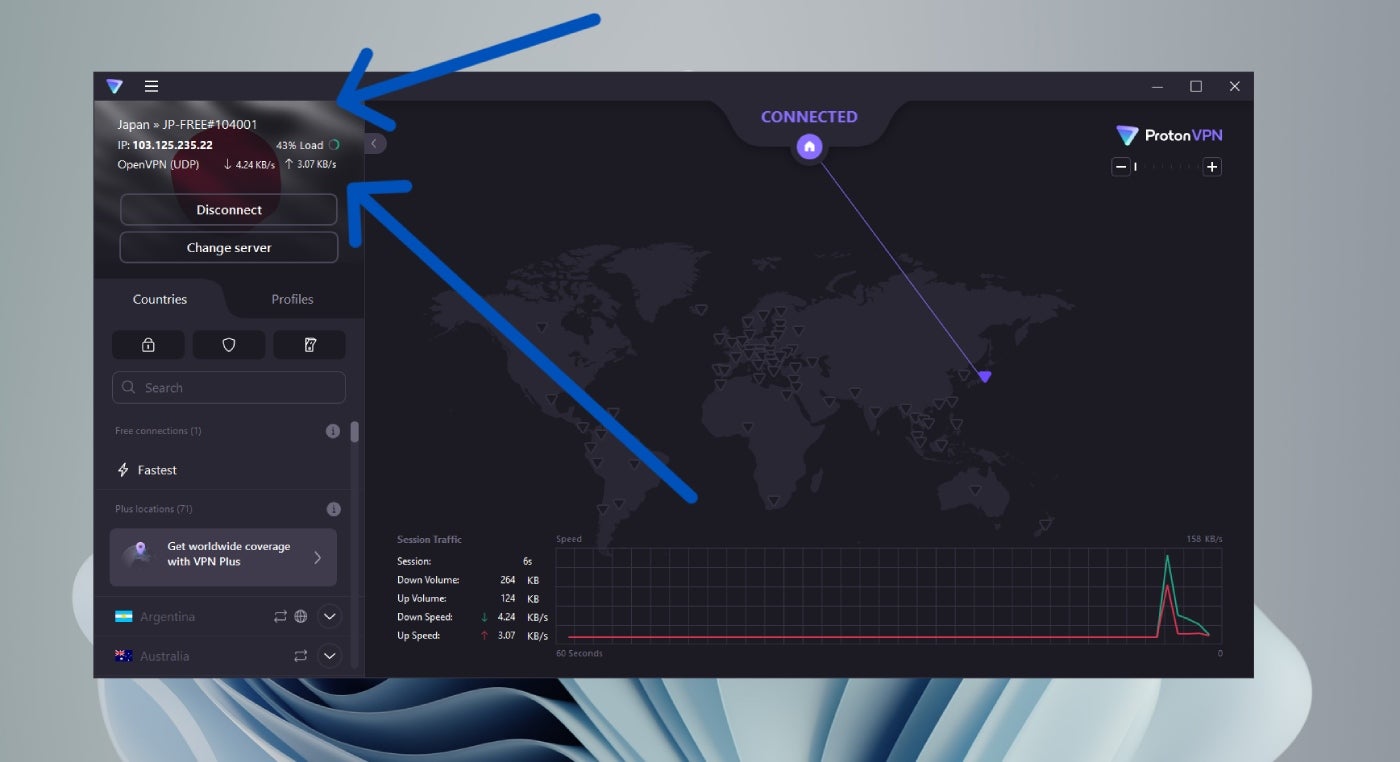
With the higher country count, users and businesses will have more location options to choose from when it comes to unblocking.
Third-party audits and track record
Winner: Proton VPN
As far as overall track record and third-party audits go, I’m giving the win to Proton VPN. While both VPN providers have undergone extensive and recent independent audits, I feel Proton VPN provides more transparency to the public when it comes to audit results.
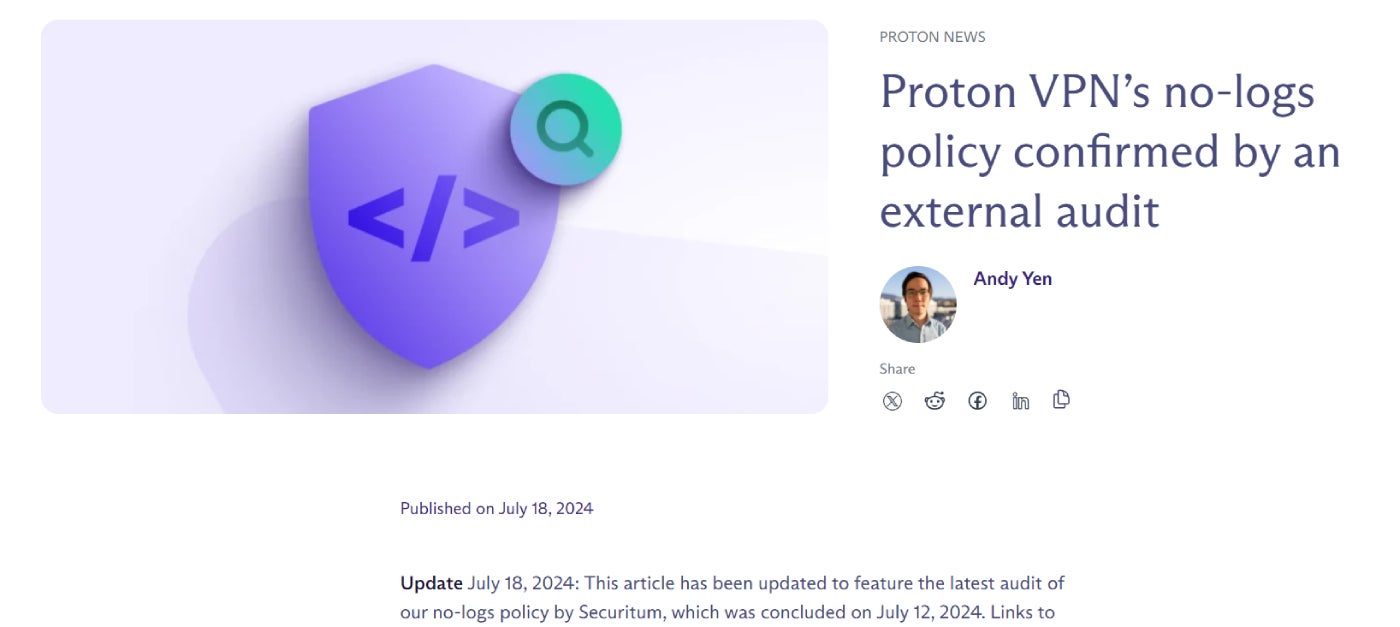
As of July 2024, Proton VPN has accomplished its third consecutive independent audit, confirming its no-logs policy. On the flipside, NordVPN has undergone four independent security audits confirming the same.
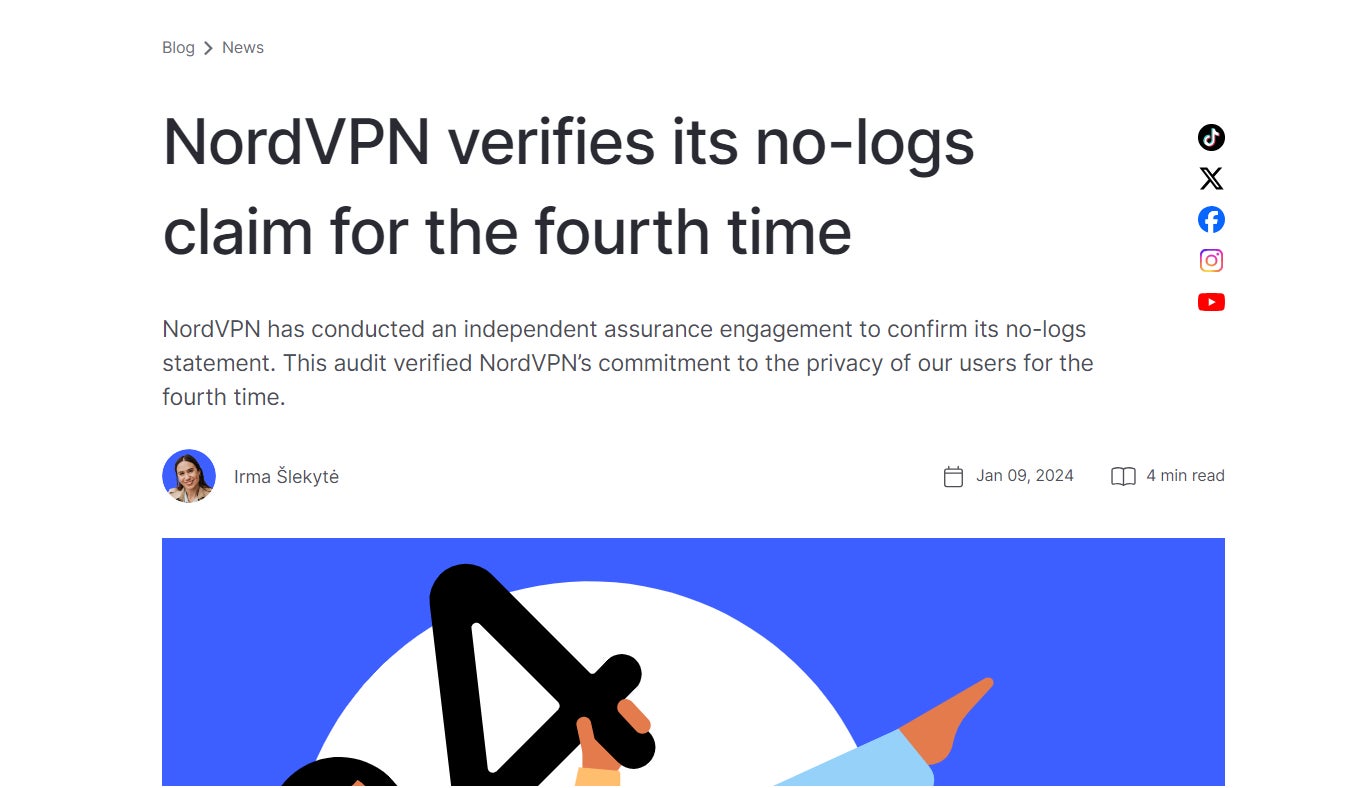
The difference lies in how they share their respective audit results. In its most recent audit, NordVPN opted not to share the full results to ensure the findings weren’t “taken out of context or misunderstood” — providing full access to the report only to those with a NordVPN account.
SEE: 4 Best Free VPNs for 2024 (TechRepublic)
On the other hand, Proton VPN provides a full link to its 2024 Securitum security audit. The audit results are accessible to both the public and official Proton VPN users.
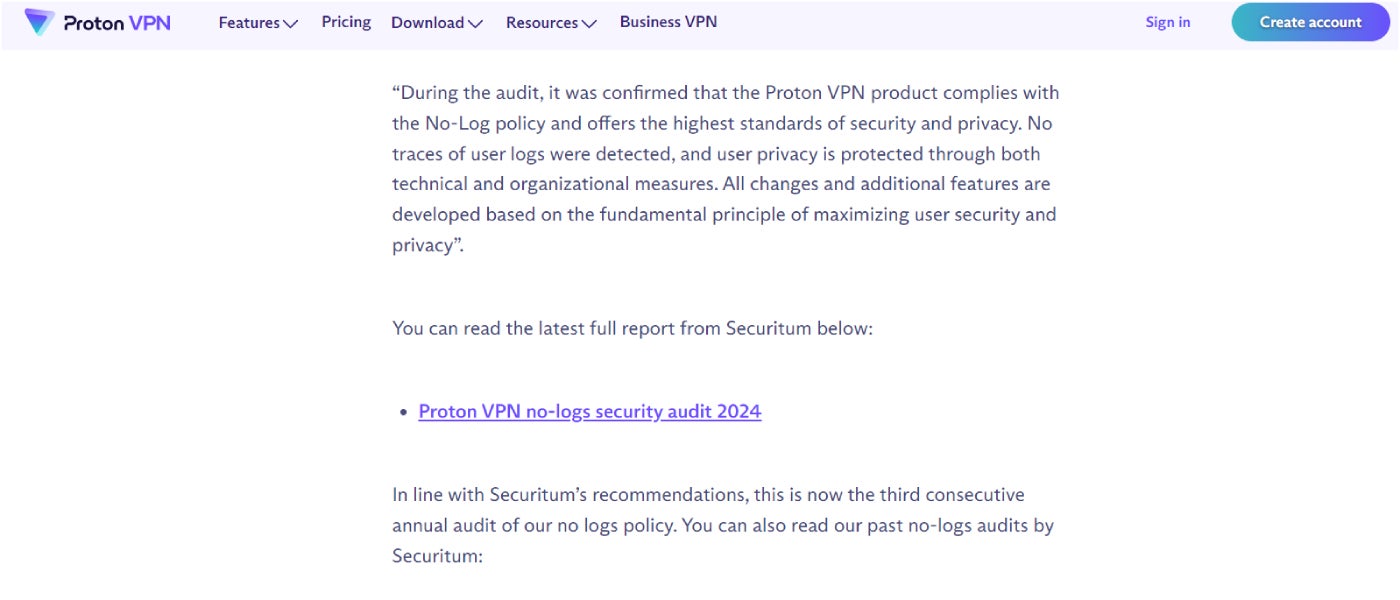
I really commend Proton VPN here, showcasing its strong commitment to keeping users informed about its service’s performance, good or bad. While NordVPN’s suite of audits is solid in its own right, I have to give this round to Proton VPN for its transparency.
Standout features
Winner: NordVPN
For standout features, NordVPN wins over Proton VPN. Aside from its main VPN service, NordVPN includes a ton of security and privacy-focused features that make it a compelling security tool for businesses.
For example, it has its Meshnet feature that lets users create their own private encrypted network, allowing them to share files or access other devices more securely.
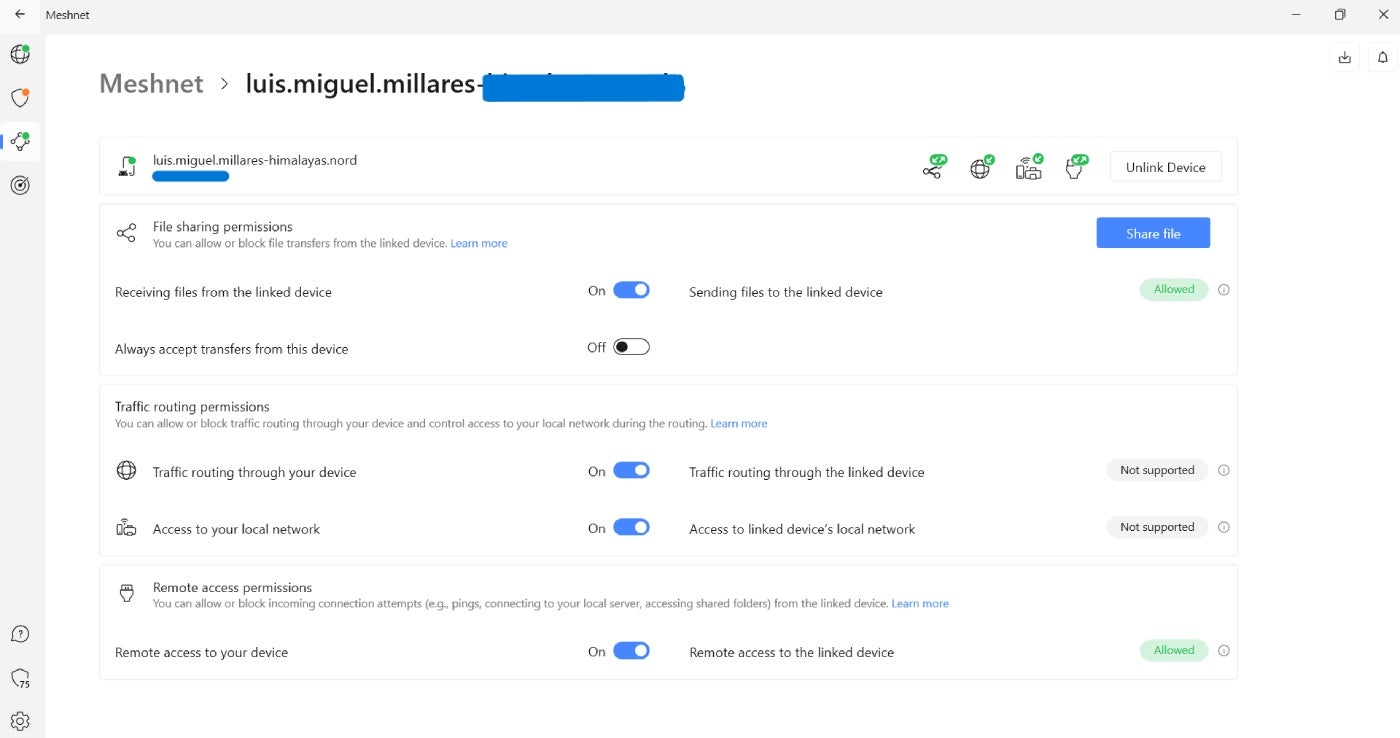
I personally like this double VPN feature that routes the user’s connection to two different VPN server locations, providing an additional layer of security alongside the encrypted VPN connection.
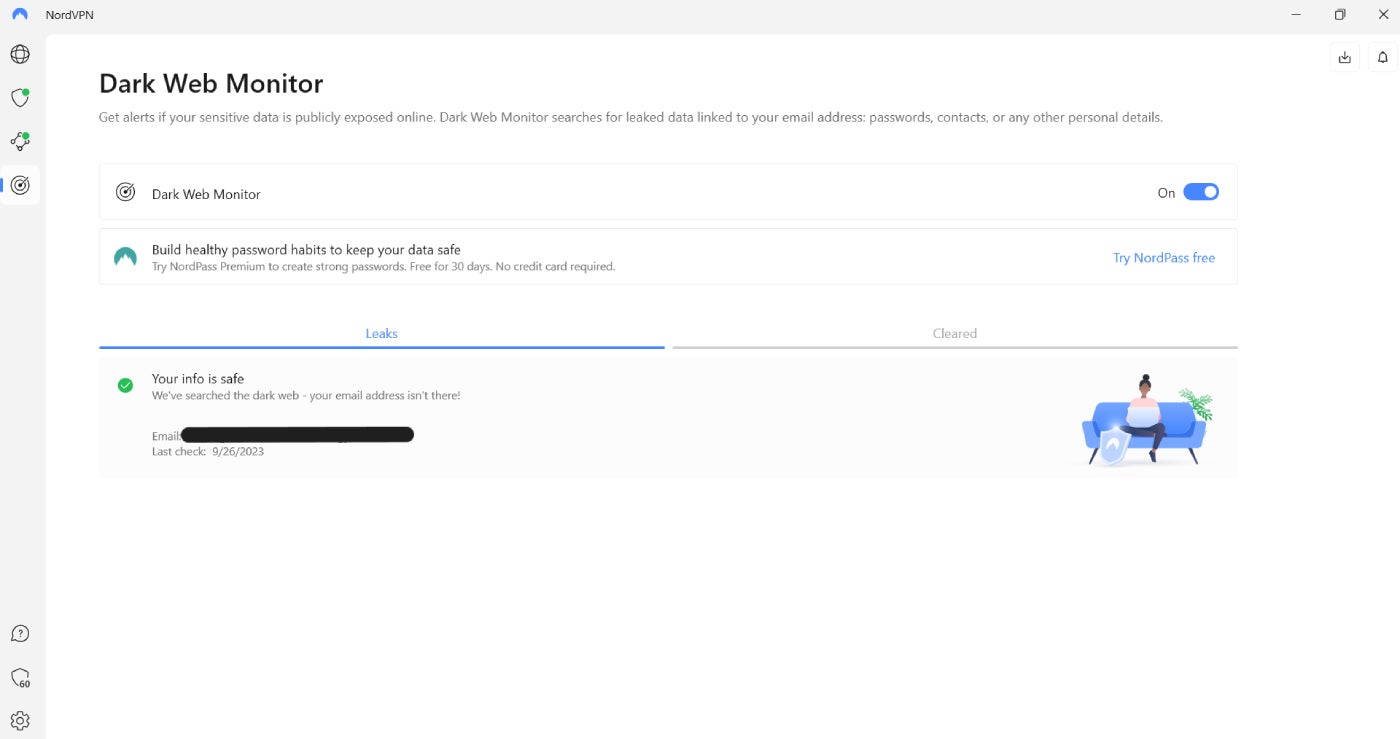
Other features include a built-in malware, web tracker and ad blocker, as well as a dark web monitor to keep track of compromised credentials, among other security capabilities.
SEE: Does a VPN Slow Down Your Internet Speed? (TechRepublic)
That isn’t to say Proton VPN doesn’t have its own standout inclusions. A highlight for me is its Swiss-based privacy. While not a software feature per se, Proton VPN’s operations are based in Switzerland, a country with some of the strongest privacy laws in the world. This means that Proton users won’t have to worry about their data being illegally accessed.
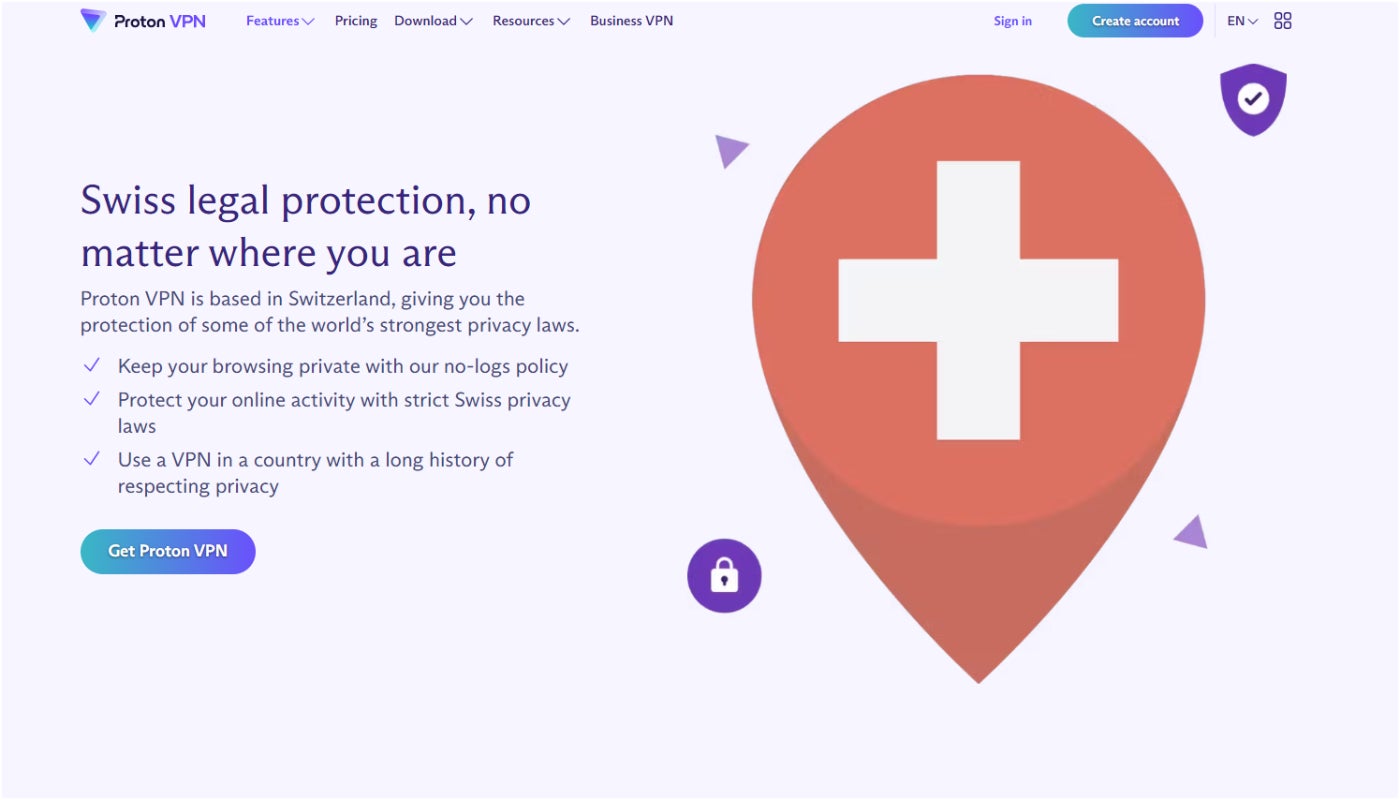
It also has a unique Stealth VPN protocol that uses obfuscation technology to mask your VPN traffic, making it seem like you aren’t connected via a VPN. This can be crucial for users in restrictive regions that don’t necessarily allow VPNs.
Overall, while Proton VPN includes useful privacy-focused features, I give the advantage to NordVPN for its extensive suite of additional functionality on top of its main VPN capabilities.
Performance and speed
Winner: NordVPN
When it comes to speed, I have to give NordVPN the advantage. During my testing, I connected to both VPNs and did my usual workflow as a writer. This involved having multiple tabs open for research, attending online video meetings, using Google Workspace apps like Docs and Drive and streaming the occasional 1080p YouTube video.
Per my experience, I had more stable speeds with NordVPN compared to Proton VPN. While I expected a decrease in speed while connected to a NordVPN server compared to my internet service provider, I honestly felt zero to little difference in speed.
SEE: How Much Does a VPN Cost? + Savings Tips (TechRepublic)
In comparison, Proton VPN also offered decently fast speeds. However, I did feel NordVPN had that slight edge in terms of consistency and overall reliability with its connection.
If your priority is having the best speeds, I find NordVPN to be the better choice out of the two.
Ease of use and design
Winner: NordVPN
For user experience, ease of use and design, NordVPN is my winner. NordVPN utilizes a minimalist, light-themed user interface that’s easy on the eyes and intuitive to navigate.

It has a sidebar on the left that neatly organizes all its important features and helps provide a clean interface that doesn’t feel cluttered, despite the number of features it houses.
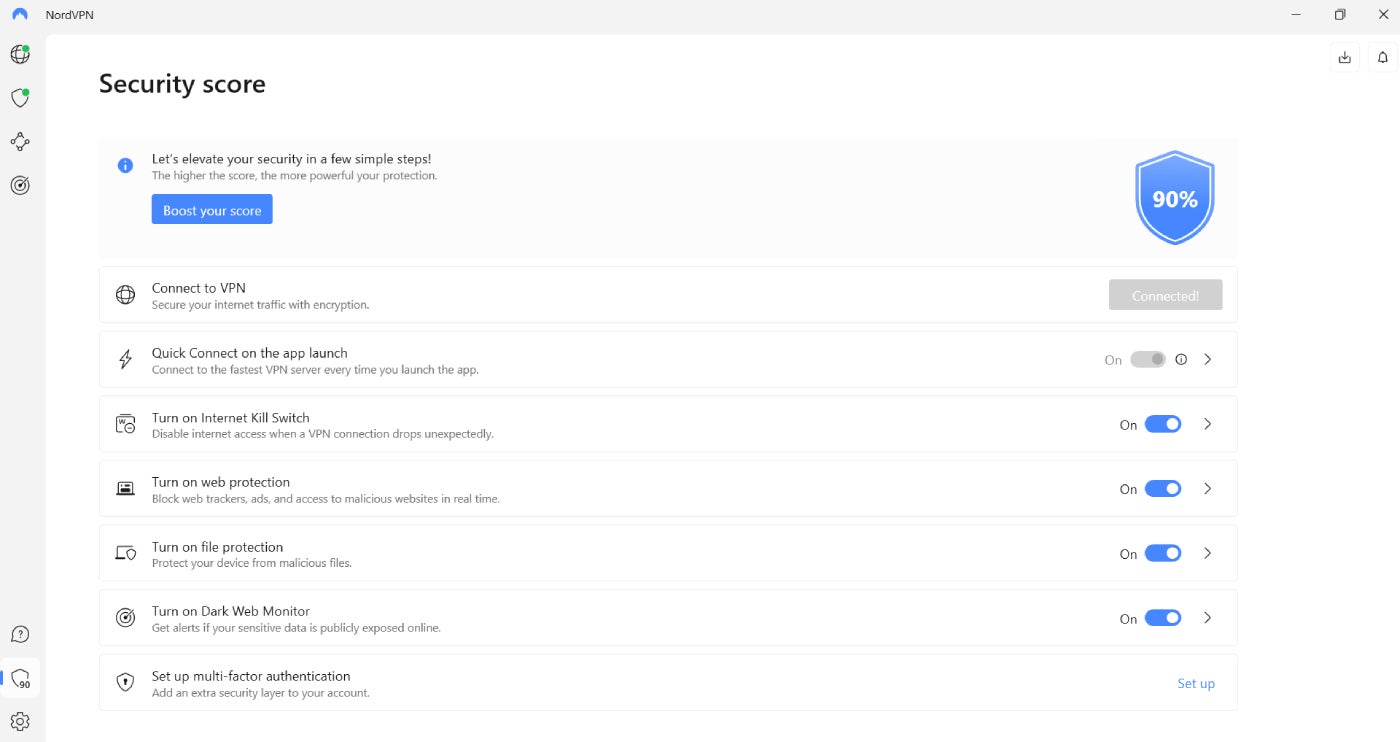
Meanwhile, Proton VPN adopts a darker themed desktop application that I find a bit less organized compared to NordVPN. While the app itself performs nicely, I think there’s a bit too much going on with its desktop app that could confuse users.
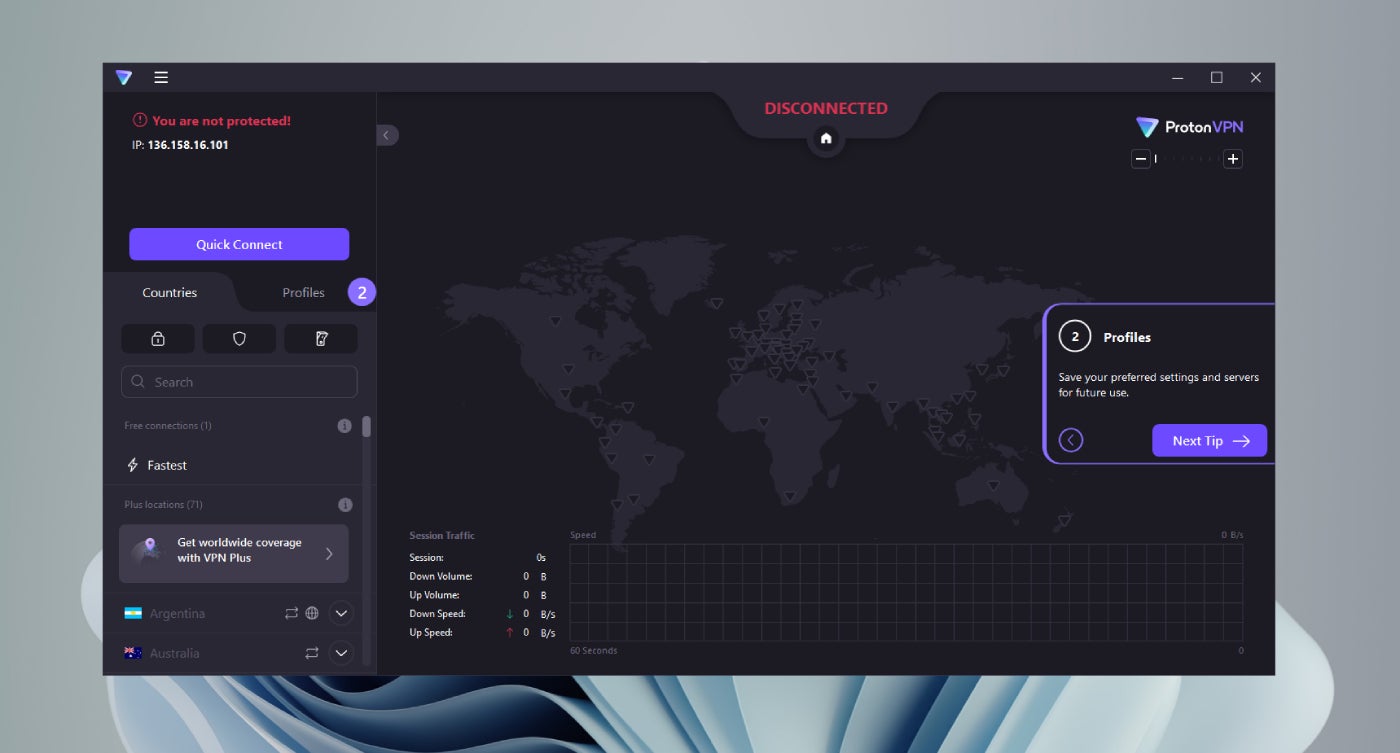
I personally think it could do a better job of organizing its features into separate menus instead of its current iteration where it has multiple buttons on a single page. For example, if we look at Proton VPN’s sidebar, we get a Countries and Profiles tab, three feature buttons, a search menu and the server list all in one place.
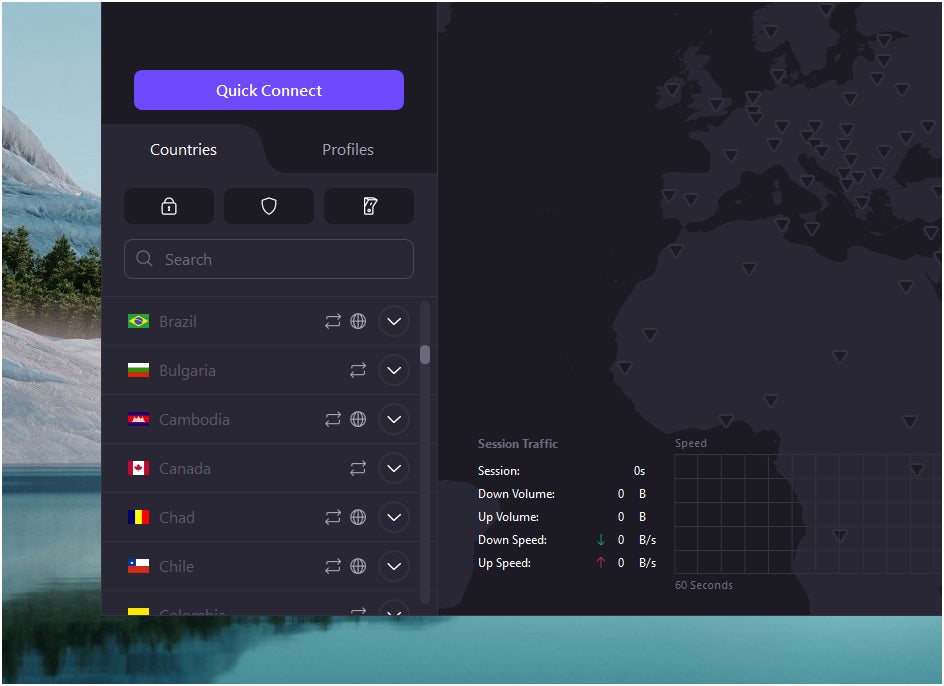
Personally, I think having all these features in one section makes Proton VPN feel a bit cluttered and disorganized. In contrast, NordVPN has a dedicated tab for each of its features, including its server list, Meshnet tool and other features.
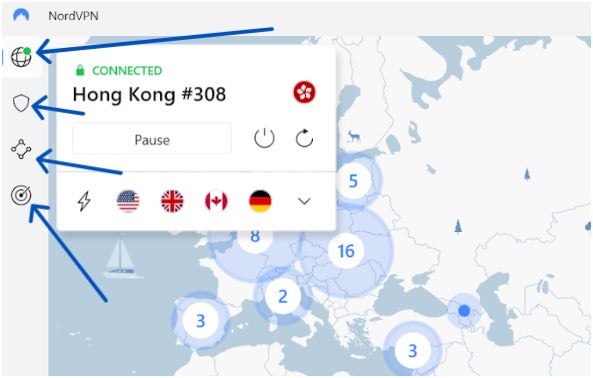
With this, I feel it helps make NordVPN the easier VPN to use out of the box. This is especially important for beginners who may not be familiar with how VPNs work.
Simultaneous device connections
Winner: Tie
Looking into simultaneous device connections, NordVPN and Proton VPN are tied. Both VPNs allow for up to 10 devices to be simultaneously connected to their VPN servers.
While I would have preferred having the ability to connect an unlimited number of devices, like Private Internet Access VPN or Surfshark VPN, I think 10 devices is still a good enough number for most businesses and users. This will allow most organizations to have a handful of smartphones, laptops and other devices connected to a VPN server all at the same time.
NordVPN pros and cons
Pros
- Servers in 111 countries, with 6,400+ servers.
- Well-designed and intuitive desktop application.
- Includes a variety of security-focused additional features.
Cons
- Full audit results require a NordVPN account.
- Free trial only accessible via Android.
- No free version.
Proton VPN pros and cons
Pros
- Based in privacy-friendly Switzerland.
- More transparent audit results.
- Has a free version with unlimited data.
Cons
- Desktop app could be streamlined.
- Fewer country locations compared to NordVPN.
Should your organization use NordVPN or Proton VPN?
For most businesses, I recommend going with NordVPN. It has a more extensive 111-country server network, a bevy of additional privacy-focused features and an easy-to-use and well-designed VPN application.
I also really like NordVPN for its overall fast and consistent VPN speeds, which provided almost zero real-world drop in performance compared to my ISP.
This isn’t to dismiss Proton VPN. I feel Proton VPN is a good choice for beginners who want to try a free VPN without any data or bandwidth restrictions.
Proton VPN is also a great option for users who are particularly worried about government surveillance. As a Switzerland-based company, it operates in a privacy-friendly country that will offer peace of mind to businesses and users with privacy concerns.
Methodology
My head-to-head match-up of NordVPN and Proton VPN involved an in-depth analysis of both VPN’s features, real-world performance and value.
To evaluate each VPN, both services were scored on everything from their server networks to their pricing. In particular, I took into account five main pillars, each having corresponding weights:
- Pricing (20%).
- Core VPN features (30%).
- Ease of use (15%).
- Customer support (30%).
- Expert analysis (5%).
I also looked into real user feedback and reputable reviews to round out my final recommendations for both NordVPN and Proton VPN.
For speed and performance, I tested both VPNs on my personal Windows computer and ran them through Ookla’s public Speedtest. Lastly, I also considered which types of businesses or individual users would best benefit from either NordVPN or Proton VPN.

